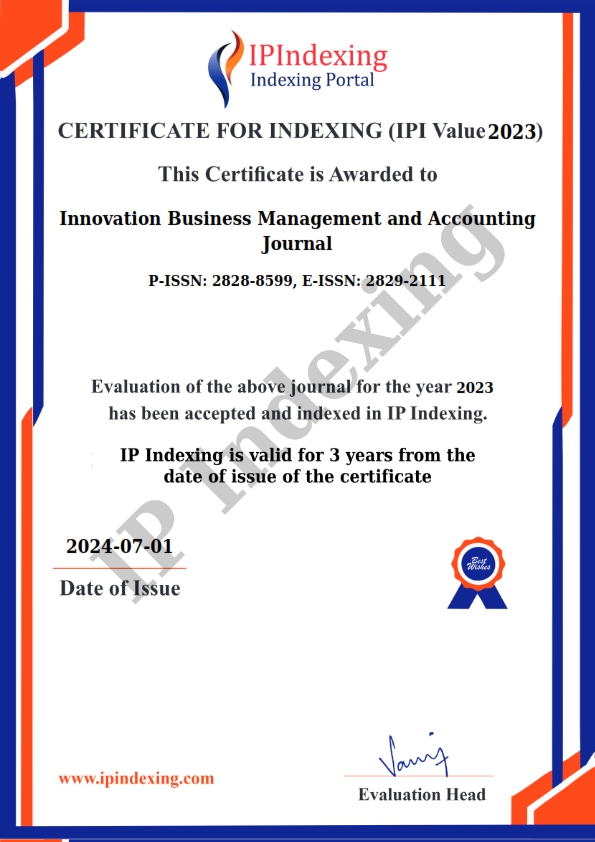Improving Employee Performance through Digitalization and Skilling Processes
DOI:
https://doi.org/10.56070/ibmaj.2024.036Keywords:
Digitalization, Employee Performance, Work SkillsAbstract
This research aims to describe digitalization, work skills, job satisfaction and employee performance and improve employee performance through the digitalization process and skills in shipping companies. The number of samples in this study was 165 people. The causal relationship between variables will be tested using the SEM analysis model. This research found that the digitalization of shipping companies' departure information and ship arrival notifications creates ease of work, which impacts employee performance in terms of quality and quantity achieved by employees. Work skills for implementing digitalization, such as inaportnet ship services, especially in terms of communication, improve the quality and quantity of employee performance. Thus, increasing employee performance has been influenced by digitalization and skills. Several theoretical and practical implications, as well as implications for further research, this research can contribute to improving employee performance. For policymakers, it becomes input in formulating information and communication technology policies to improve performance in shipping companies. As a suggestion for further research, further research is required to examine the issue of improving employee performance through digitalization and general work skills on cruise ships.
Downloads
References
Claro, M., Preiss, D. D., San Martín, E., Jara, I., Hinostroza, J. E., Valenzuela, S., ... & Nussbaum, M. (2012). Assessment of 21st century ICT skills in Chile: Test design and results from high school level students. Computers & Education, 59(3), 1042-1053. https://doi.org/10.1016/j.compedu.2012.04.004
DeGuzman, A. B., & Choi, K. O. (2013). The Relations Of Employability Skills To Career Adaptability Among Technical School Students. Journal of Vocational Behavior, 82(3), 199-207. https://doi.org/10.1016/j.jvb.2013.01.009
Harjono, H., Triatmanto, B., & Supriadi, B. (2024). The Role of Entrepreneurial Orientation and Entrepreneurial Leadership of SMEs in the City of Surakarta, Indonesia. Innovation Business Management and Accounting Journal, 3(1), 70-78.
Hawa, P., & Salomo, R. V. (2020). Kesiapan digitalisasi Layanan Sistem Pemerintahan Berbasis Elektronik Pada Badan Pengkajian dan Penerapan Teknologi (BPPT). Restorica: Jurnal Ilmiah Ilmu Administrasi Negara Dan Ilmu Komunikasi, 6(1), 8-19. https://doi.org/10.33084/restorica.v6i1.1251
Jara, I., Claro, M., Hinostroza, J. E., San Martín, E., Rodríguez, P., Cabello, T., ... & Labbé, C. (2015). Understanding factors related to Chilean students' digital skills: A mixed methods analysis. Computers & Education, 88, 387-398. https://doi.org/10.1016/j.compedu.2015.07.016
Kim, H. J., Hong, A. J., & Song, H. D. (2018). The relationships of family, perceived digital competence and attitude, and learning agility in sustainable student engagement in higher education. Sustainability, 10(12), 4635.
Kim, H. J., Hong, A. J., & Song, H. D. (2019). The roles of academic engagement and digital readiness in students’ achievements in university e-learning environments. International Journal of Educational Technology in Higher Education, 16(1), 1-18. https://doi.org/10.1186/s41239-019-0152-3
Mc Easy, 23 Desember 2021, Permasalahan di Bidang Pelayaran, Sinarmas Land Plaza Lt. 8 Unit 801-803, Jl. Pemuda No. 60 - 70 Surabaya, 60271 - Jawa Timur, Indonesia, https://www.mceasy.co.id/post/permasalahan-di-bidang-pelayaran
Poister, T. H. (2010). The future of strategic planning in the public sector: Linking strategic management and performance. Public administration review, 70, s246-s254.
Rasaki, E. O., & Abioye, A. (2018). Human, conceptual and technical skills as determinants of preservation management in university libraries in Southern Nigeria. Global Knowledge, Memory and Communication, 67(1/2), 34-51. https://doi.org/10.1108/GKMC-08-2016-0067
Robbins, S. P. (2016). Organizational Behavior. New Jersey, Prentice-Hall.
Robinson, J. P. (2000). What are employability skills. The workplace, 1(3), 1-3.
Sanusi, A. (2011). Metode Penelitian Bisnis. PT Salemba Empat.
Soomro, B. A., & Shah, N. (2019). Determining the impact of entrepreneurial orientation and organizational culture on job satisfaction, organizational commitment, and employee’s performance. South Asian Journal of Business Studies, 8(3), 266-282. https://doi.org/10.1108/sajbs-12-2018-0142
Sulistyan, R. B., Carito, D. W., Cahyaningati, R., & Muttaqien, F. (2023). Application of Digital Marketing in Efforts to Empower Productive Communities and Preserve Banyuwangi Culture. International Journal of Public Devotion, 6(1), 75-82. https://doi.org/10.26737/ijpd.v6i1.4075
Suryaning, B., Sanusi, A., Supriadi, B., Triatmanto, B., & Widarni, E. L. (2023). Effects of Asset Diversification and Human Capital Efficiency on Bank Performance: Evidence from Asian Countries. The Journal of Asian Finance, Economics and Business (JAFEB), 10(1), 123-132.
Van Laar, E., Van Deursen, A. J., Van Dijk, J. A., & De Haan, J. (2017). The relation between 21st-century skills and digital skills: A systematic literature review. Computers in human behavior, 72, 577-588. https://doi.org/10.1016/j.chb.2017.03.010
Yang, H., Cheung, C., & Song, H. (2016). Enhancing the learning and employability of hospitality graduates in China. Journal of Hospitality, Leisure, Sport & Tourism Education, 19, 85-96. https://doi.org/10.1016/j.jhlste.2016.08.004
Zhen, Z., Yousaf, Z., Radulescu, M., & Yasir, M. (2021). Nexus of digital organizational culture, capabilities, organizational readiness, and innovation: Investigation of SMEs operating in the digital economy. Sustainability, 13(2), 720. https://doi.org/10.3390/su13020720
Downloads
Published
How to Cite
Issue
Section
License
Copyright (c) 2024 Hadiansyah Hadiansyah, Grahita Chandrarin, Bambang Supriadi

This work is licensed under a Creative Commons Attribution-ShareAlike 4.0 International License.



